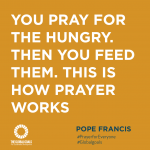“What If You’re Not a Good Person?”
“What if you’re not a good person?” There is no path forward but to admit it, to accept it, to sink down deep into the knowing of this truth: I am not a good person. There are some good things I do, there are signs of the imago Dei too, but there is also a badness deep inside me that is self-centered and perverse, that considers my own needs before my neighbor’s, that clings to prejudices, that is “in bondage to sin and unable to free myself” (as the old prayer of confession in the Lutheran church says). I am hopelessly entangled in the web of my own sin and the sins of society. How can I even begin the process of change if I cannot sit down in an honest moment and admit to myself my own badness, my own complicity in society’s badness?
The starting place of any twelve-step program is confession and acceptance that one indeed has a problem. In Alcoholics Anonymous, it is said this way: “We admitted we were powerless over alcohol–that our lives had become unmanageable.” Those in twelve-step programs know that one must not just admit this once in their lives but must rather admit it daily. There must be daily confession of one’s problem. One never “arrives” at complete recovery; rather, one is in recovery.
This cuts against the grain of American triumphalism, which whitewashes history, turns the focus of blame on others, and congratulates oneself on being a patriot instead of a pinhead. It also cuts against the grain of American liberalism, which desperately runs the hamster wheel trying to get to “the right side of history” and desperately seeks assurance from neighbors that one is good, after all. It’s a painful admission, but the start of any recovery is always painful. In fact, it is painful and humbling each and every day.
The Good News of “Alien Righteousness” Leads Us to Our Neighbor
If we stopped there, at the admission of our own badness, surely we would face despair. We would be so lost in our despair over this badness, that we would be completely focused on self and unable to focus on our neighbor at all.
That is why the Christian message of Christ’s imputed righteousness (what Martin Luther called our “alien righteousness”) is so important. It kills our pride dead because it makes us acknowledge that we are not triumphal and we are not on the right side of history. It shows us our need of a righteousness that comes from outside ourselves. That is deeply humbling and painful. That is why the Apostle Paul describes baptism as a “death” (Romans 6). We go down into the waters of baptism, and our old self is drowned in those waters. It is drowned because we are not good people. Christians sometimes have looked at this baptism as a one-time act, and it is that, but it is also what Luther described as a “daily drowning” of repentance. If Luther had lived today, he might say, “it’s a daily being in recovery.”
But here’s the thing. The good news. We come up out of those waters of baptism fresh and new as a baby from a womb. Our hair, our skin smell of sweet, fresh, new life. And just like a baby can’t get herself born, we can’t get ourselves born either. It’s something that happens to us. Our new existence is something that is gifted to us. It is Christ’s righteousness imputed to us. And as that happens, not just once, but each and every day, we are filled with relief. No more hamster wheel. No more desperate search to be on the right side of history, or to be a patriot not a pinhead.
It’s no longer all about us.












